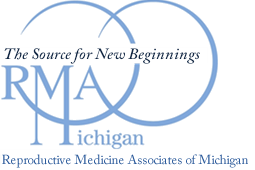Egg Freezing in Michigan
Egg freezing, also known as oocyte cryopreservation, is a technique used to preserve a woman’s eggs so they can be utilized at a later time. Egg freezing involves harvesting eggs from the female’s ovaries after she has taken medication to stimulate her ovaries to produce multiple follicles. She then undergoes a procedure called vaginal oocyte retrieval to retrieve the eggs, which are frozen later that day.
Why Do Women Freeze Their Eggs?
There are several reasons why women may want to freeze their eggs.
- She has been diagnosed with cancer, and the chemotherapy and/or radiation may result in permanent infertility.
- She has a family history of premature ovarian failure which means she is at risk for her ovaries failing at an early age.
- She may not be ready to start a family due to career or educational demands.
- She doesn’t have a partner or isn’t ready to start a family.
Women’s fertility starts declining in their 20s, and after age 35, pregnancy rates start to decrease more dramatically. This results from the quality and quantity of eggs dropping as women age. As a result, it is recommended that women who want to freeze their eggs do so by age 35. However, that doesn’t mean a woman older than 35 can’t freeze her eggs. It just means that she will need to sit down with her doctor to make an informed decision to determine if it is worth pursuing.
Things to Know About Egg Freezing
There are a few things women need to understand in regards to egg freezing:
- Some women may need to do more than one egg freezing cycle to get enough eggs. Research shows that a woman under 35 should freeze at least 15 mature eggs for an 85% chance of at least one live birth.
- There is no guarantee that she will ever need to utilize her frozen eggs to get pregnant. She may end up getting pregnant on her own and will never be use the frozen eggs.
- There is no guarantee that freezing your eggs will end up resulting in a live birth.
- It takes approximately two to three weeks to complete the egg freezing process.
Egg Freezing Process
Step 1: Testing & Assessment
You will have your initial consultation with a physician to discuss your medical history and determine if egg freezing may be appropriate for you. You will have blood work done on day three of your period to assess hormone function and ovarian reserve. An ultrasound of the ovaries will be performed to get a better overview of your ovarian function.
Step 2: Ovarian Stimulation
You will give yourself synthetic hormone injections to stimulate your ovaries to produce as many eggs as possible rather than the single egg that typically develops. During this process, you will be monitored by having blood tests to see how your body responds to the medications. You will also have an ultrasound to see how many follicles (small fluid-filled sacs where the egg matures) develop. Once your follicles have developed and are ready for egg retrieval – usually 10-14 days later – you will use a different injection medication (HCG) to start the ovulation process.
Step 3: Egg Retrieval
Typically 36 hours after the HCG injection, your physician will retrieve your eggs during an outpatient procedure performed while you are under anesthesia. A needle is guided through the wall of your vagina into the follicles under ultrasound guidance. After the procedure is done and anesthesia has worn off, you can go home with the assistance of a support person who can drive you. You will be able to return to work within 24-48 hours and resume normal activities within a week.
Step 4: Egg Freezing
After egg retrieval, all mature eggs will be vitrified (rapidly frozen) and stored until you’re ready to use them. Your physician will update you, so you know how many mature, healthy eggs have been frozen.
If you are interested in egg freezing, please contact our fertility clinic in Michigan at (248) 329-0086 to Schedule an initial consultation.
